常见词性转换的方法
- 格式:docx
- 大小:28.22 KB
- 文档页数:5
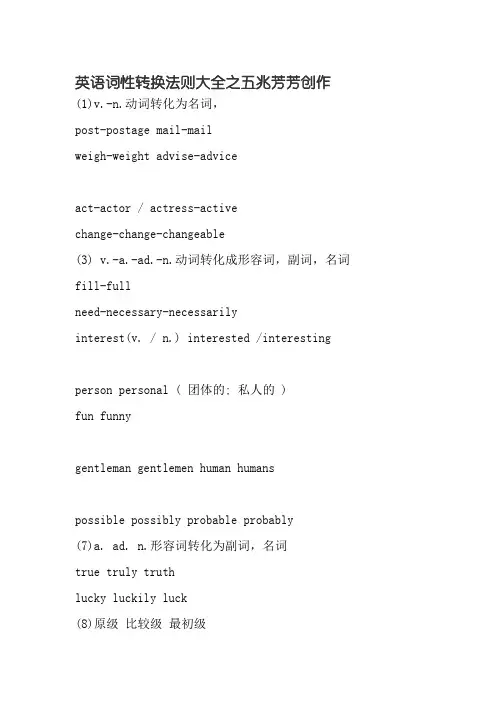
英语词性转换法则大全之五兆芳芳创作(1)v.-n.动词转化为名词,post-postage mail-mailweigh-weight advise-adviceact-actor / actress-activechange-change-changeable(3) v.-a.-ad.-n.动词转化成形容词,副词,名词fill-fullneed-necessary-necessarilyinterest(v. / n.) interested /interestingperson personal ( 团体的; 私人的 )fun funnygentleman gentlemen human humanspossible possibly probable probably(7)a. ad. n.形容词转化为副词,名词true truly truthlucky luckily luck(8)原级比较级最初级far farther / further farthest / furthestlittle less least一、名词变成形容词的办法1. 在名词前面加-y可以酿成形容词(尤其是一些与天气有关的名词).例如:rain—rainy, cloud—cloudy, wind—windy, snow—snowy, health—healthy, luck—lucky等.注意:1)如果名词以重读闭音节结尾,且词尾只有一个子音字母,这时应双写词尾的子音字母再加-y.如:sun—sunny, fun—funny等.2)少数以不发音的e结尾的名词变成形容词时,应去掉e再加-y.例如:noise—noisy, ice—icy 等.2. 一些抽象名词在词尾加-ful可以变成形容词.例如:care—careful, thank—thankful, help—helpful, use—useful, beauty—beautiful等.3. 一些暗示国度的名词可以在词尾加-ese, -ish或-n组成暗示国籍、语言的形容词.例如:China—Chinese, Japan—Japanese, England—English, America—American, India—Indian, Australia —Australian(注意Canada—Canadian).4.在名词后加-ous变成形容词.例如:danger—dangerous等.5. 在名词后加-ly变成形容词.例如:friend—friendly, love—lovely等.6.在名词后加-less组成含有否认意义的形容词.例如:care—careless(粗心的),use—useless(无用的),hope—hopeless(没希望的),home—homeless(无家可归的)等.7. 一些以-ence结尾的名词,把ence改成ent酿成形容词.例如:difference—different, silence—silent等.二、动词变成名词的办法1.词形不变,词性改动.例如:work, study, water, plant等可以用作动词,也可以用作名词.2. 一些动词在词尾加上-er或-or之后就酿成了暗示“某一类人”的名词.例如:work—worker, teach—teacher, sing—singer, jump—jumper, play—player, learn—learner, visit—visitor, invent—inventor等.注意:1)以不发音的e结尾的动词,在词尾加-r.例如:drive—driver, write—writer等.2)以重读闭音节结尾,且末尾只有一个子音字母的动词,应双写末尾的子音字母,再加-er.例如:run—runner, win—winner, begin—beginner等.3. 在动词词尾加-ing酿成名词(办法与动词变成现在分词的办法相同).例如: meet—meeting, build—building, wait—waiting, wash—washing, swim—swimming, shop—shopping, begin—beginning等.三、形容词变成副词的办法一般在形容词的词尾加-ly可以酿成副词.例如:quick—quickly, slow—slowly, loud—loudly, sudden—suddenly 等.但是,以下几点值得注意:1. 一些以“子音字母+y”结尾的形容词,要把y改成i再加-ly.例如:happy—happily, angry—angrily, lucky—luckily, heavy—heavily, noisy—noisily 等.2. 有些以-ble或-le结尾的形容词,去掉e加-y.例如:possible—possibly, terrible—terribly等.3. 少数以e结尾的形容词,要去掉e再加-ly.例如:true—truly等.但绝大多数以e结尾的形容词仍然直接加-ly.例如:polite—politely, wide—widely等.4. 以-l结尾的形容词变成副词时仍然要在词尾加-ly,而不是只加-y.除非是以-ll结尾的才在词尾只加-y.例如:usual—usually, careful—carefully, useful—usefully, full—fully等.。
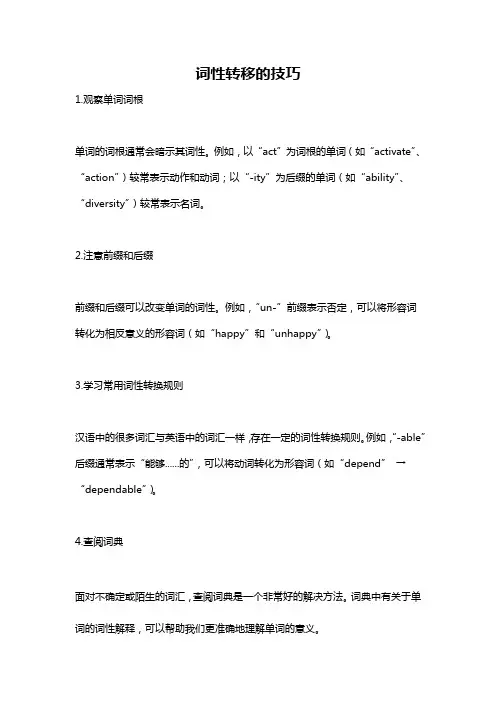
词性转移的技巧
1.观察单词词根
单词的词根通常会暗示其词性。
例如,以“act”为词根的单词(如“activate”、“action”)较常表示动作和动词;以“-ity”为后缀的单词(如“ability”、“diversity”)较常表示名词。
2.注意前缀和后缀
前缀和后缀可以改变单词的词性。
例如,“un-”前缀表示否定,可以将形容词转化为相反意义的形容词(如“happy”和“unhappy”)。
3.学习常用词性转换规则
汉语中的很多词汇与英语中的词汇一样,存在一定的词性转换规则。
例如,“-able”后缀通常表示“能够......的”,可以将动词转化为形容词(如“depend”→“dependable”)。
4.查阅词典
面对不确定或陌生的词汇,查阅词典是一个非常好的解决方法。
词典中有关于单词的词性解释,可以帮助我们更准确地理解单词的意义。
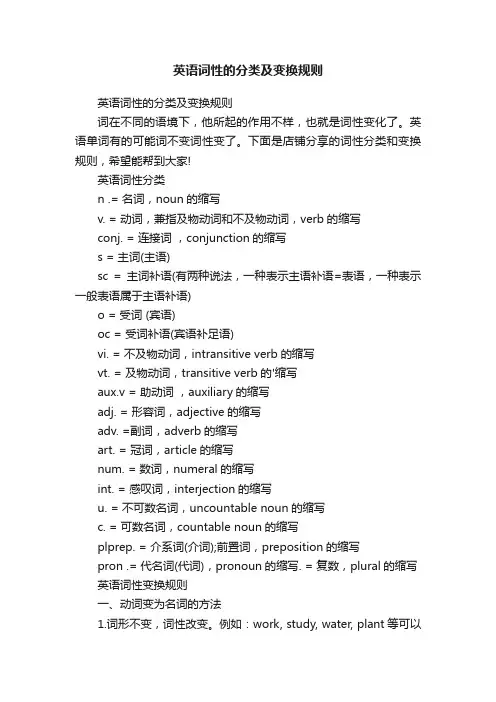
英语词性的分类及变换规则英语词性的分类及变换规则词在不同的语境下,他所起的作用不样,也就是词性变化了。
英语单词有的可能词不变词性变了。
下面是店铺分享的词性分类和变换规则,希望能帮到大家!英语词性分类n .= 名词,noun的缩写v. = 动词,兼指及物动词和不及物动词,verb的缩写conj. = 连接词,conjunction的缩写s = 主词(主语)sc = 主词补语(有两种说法,一种表示主语补语=表语,一种表示一般表语属于主语补语)o = 受词 (宾语)oc = 受词补语(宾语补足语)vi. = 不及物动词,intransitive verb的缩写vt. = 及物动词,transitive verb的'缩写aux.v = 助动词,auxiliary的缩写adj. = 形容词,adjective的缩写adv. =副词,adverb的缩写art. = 冠词,article的缩写num. = 数词,numeral的缩写int. = 感叹词,interjection的缩写u. = 不可数名词,uncountable noun的缩写c. = 可数名词,countable noun的缩写plprep. = 介系词(介词);前置词,preposition的缩写pron .= 代名词(代词),pronoun的缩写. = 复数,plural的缩写英语词性变换规则一、动词变为名词的方法1.词形不变,词性改变。
例如:work, study, water, plant等可以用作动词,也可以用作名词。
2. 一些动词在词尾加上-er或-or之后就变成了表示“某一类人”的名词。
例如:work—worker, teach—teacher, sing—singer, jump—jumper, play—player, learn—learner, visit—visitor, invent—inventor等。
注意:1)以不发音的e结尾的动词,在词尾加-r。
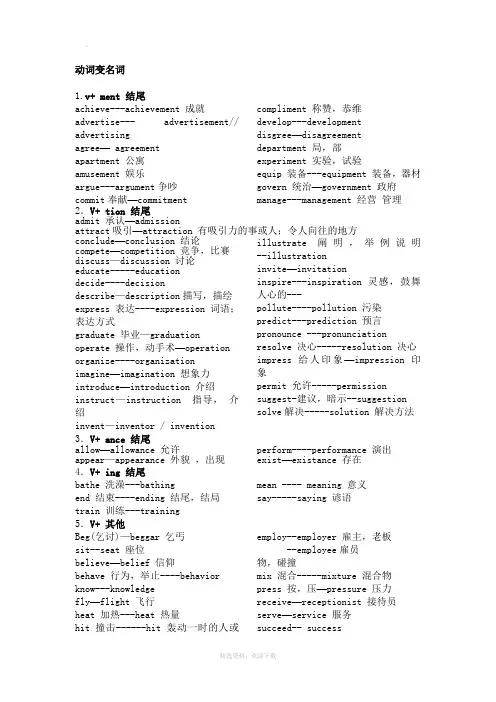
动词变名词1.v+ ment 结尾achieve---achievement 成就advertise--- advertisement// advertisingagree— agreementapartment 公寓amusement 娱乐argue---argument争吵commit奉献—commitment compliment 称赞,恭维develop---development disgree—disagreement department 局,部experiment 实验,试验equip 装备---equipment 装备,器材govern 统治—government 政府manage---management 经营管理2.V+ tion 结尾admit 承认—admissionattract吸引—attraction 有吸引力的事或人;令人向往的地方conclude—conclusion 结论compete—competition 竞争,比赛discuss—discussion 讨论educate-----educationdecide----decision describe—description描写,描绘express 表达----expression 词语;表达方式graduate 毕业—graduation operate 操作,动手术—operation organize----organization imagine—imagination 想象力introduce—introduction 介绍instruct—instruction 指导,介绍invent—inventor / invention illustrate 阐明,举例说明--illustrationinvite—invitationinspire---inspiration 灵感,鼓舞人心的---pollute----pollution 污染predict---prediction 预言pronounce ---pronunciation resolve 决心-----resolution 决心impress 给人印象—impression 印象permit 允许-----permissionsuggest-建议,暗示--suggestion solve解决-----solution 解决方法3.V+ ance 结尾allow—allowance 允许appear—appearance 外貌,出现perform----performance 演出exist—existance 存在4.V+ ing 结尾bathe 洗澡---bathingend 结束----ending 结尾,结局train 训练---training mean ---- meaning 意义say-----saying 谚语5.V+ 其他Beg(乞讨)—beggar 乞丐sit--seat 座位employ--employer 雇主,老板--employee雇员believe—belief 信仰behave 行为,举止----behavior know---knowledgefly—flight 飞行heat 加热---heat 热量hit 撞击------hit 轰动一时的人或物,碰撞mix 混合-----mixture 混合物press 按,压—pressure 压力receive—receptionist 接待员serve—service 服务succeed-- successtour 在-----旅游,在-----作巡回演出直接+地点 tour China ---tour 旅游/ tourist 游客pursue—pursuit 追求,从事propose—proposal 建议withdraw—withdrawal 取钱;收回;撤退survive—survival--survivor 幸存者arrive-- arrival到达analyze—analysis 分析名词变形容词1名词+yanger 生气-----angry honest—honesty 诚实的hunger---hungry fog—foggy有雾的fur----furry 毛皮的guilt 罪恶---guilty 内疚的health---healthyluck---luckycloud---cloudy wind—windy rain---rainysnow---snowysun—sunnytourist------touristy 游客多的business---busysalt 盐--- salty 咸的shine---shiny 发亮的silk 丝绸—silky 丝绸般的sleep---sleepy 昏昏欲睡的taste 口味,品味------tasty 甜的2.名词+ edbalance –balanced 平衡的spot 斑点,地点----spotted 有斑点的talent-----talented 有天赋的organized 有组织的distusted 厌恶的offended 生气的crowded 拥挤的polluted 被污染的pleased 高兴的3.名词+ ful/lessmeaning—meaningful 有意义的care—careful/ careless 小心的;粗心的help---helpful / helpless home—homeless 无家可归的colour---colourful pain 疼痛---painful 痛苦的use---useless/ useful thank—thankful 充满感激的peace 和平 ---- peaceful 平静的,宁静的playful 顽皮的,爱玩耍的4.名词+ ableadjustable 可调整的comfort---comfortable knowledge---knowledgeable suit 一套-----suitable 合适的5.名词+ ouscourage—courageous 勇敢的danger—dangerousmystery 神秘-----mysterious 神秘的6.ce 变 tconfidence----confident difference---different dependence—dependentindependence--independent 7. al 结尾Addition—additional 附加的,额外的Class—classical 经典的medicine 药----medical 医学的music---musicalnature---natural 自然的person---personal (私人的) nation—national 国家的education---educational有教育意义的tradition----traditional 传统的origin起源---original 新颖的;独创的grammar—grammatical 语法的globe—global 全球的8.名词+ lyfriend—friendlylive---lively 活跃的,有生气的love—lovely 可爱的9.+ en 结尾wood—wooden 木制的wool—woolen 羊毛的10. 其他energy精力---energetic strategy—strategic 战略的fool 傻子—foolish 愚蠢的freedom 自由—free 空的,免费的height 高度—highillness 疾病--- ill love—loving 慈爱的death---deadpleasure---pleasant / pleased popularity 流行性—popular pride---proudscientist----scientific 科学的形容词变副词1.形容词+ lybad—badlybright—brightly 明亮地casual—casually 随意地clear—clearly 清楚地complete—completely 完全correct---correctly 正确地final--finally fortunate—fortunately幸运地general—generally 一般来讲loud—loudlyparticular 特殊的,独特的—particularlypolite—politelyproper 合适的-,恰当的---properly main------mainly 主要地most 多数-----mostly 多半,大多数normal---normally 正常地quick—quicklyquiet—quietly 轻轻地,安静地real—reallyrecent 最近的----recently 最近;近来hard 难的;努力地---hardly 几乎不late 迟的—lately 最近;近来sad--sadlyslow---slowlyspecial—specially 专门,特殊地specific---specifically 特定地,明确地strong—strongly 坚决地,强烈地sudden—suddenly突然usual—usually2. 以le 结尾的去e + ycomfortable---comfortably gentle—gently possible---possiblysimple ----simply 仅仅;只;简单地terrible---terribly 3. 辅音字母+ y 变 ilyeasy—easilyheavy—heavilyhappy--happily4.特殊good—well好地 well 身体健康的,井true—truly形容词变名词efficient有效率的—efficiency 效率patient—patience/impatience dependent—dependenc依赖性independent—independency 独立性true—truth high—height wide—width long—lengthpossible—possibilityresponsible—responsibilityurgent—urgency 紧急prosperous—prosperity 繁荣accurate—accuracy 准确性形容词变动词modern—modernize social--socialize fast--fasten short/shorten long—lengthen—length(n.) wide--widen less--lessen strong—strengthen—strength(n.)large—enlarge名词变动词computer--computerize名词---形容词—副词beauty 美,美人—beautiful—beautifully care—careful—carefully care—careless—carelessly difference---different---differe ntly fortune—fortunate—fortunately/ unfortunately happiness—happy—happily hunger—hungry--hungrily health—healthy—healthily luck—lucky—luckily noise—noisy—noisily pride—proud—proudly骄傲地sadness—sad—sadlysafety 安全;安全的地方—safe—safelysilence—silent---silently 默默地success—successful—successfullytruth—true—truly unluck—unlucky—unluckily wonder 奇迹—wonderful—wonderfully方位的词名词—形容词East—eastern West—western South—southern North---northernIn the west of ChinaIn the western part of China四大洲名词-----形容词Asia 亚洲–---- AsianAfrica 非洲----- AfricanEurope欧洲----- EuropeanAmerica 美洲-----American既是形容词又是副词early get up early ;an early trainlate be late for classcome late for schooldeep dive deep into the seaa hole deep largehigh jump high;a high mountainhard a hard question;a hard stone work hard / study hardrain hardlong It takes too longIt takes a long timefar jump farMy home is far from school straight a straight linego straight along hereWelcome !!! 欢迎您的下载,资料仅供参考!。
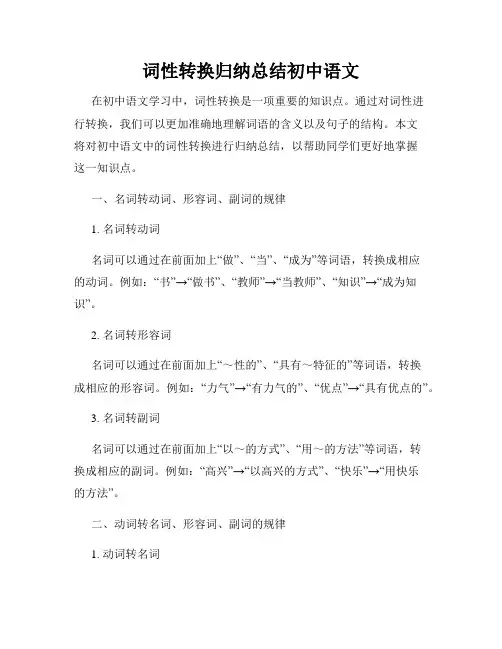
词性转换归纳总结初中语文在初中语文学习中,词性转换是一项重要的知识点。
通过对词性进行转换,我们可以更加准确地理解词语的含义以及句子的结构。
本文将对初中语文中的词性转换进行归纳总结,以帮助同学们更好地掌握这一知识点。
一、名词转动词、形容词、副词的规律1. 名词转动词名词可以通过在前面加上“做”、“当”、“成为”等词语,转换成相应的动词。
例如:“书”→“做书”、“教师”→“当教师”、“知识”→“成为知识”。
2. 名词转形容词名词可以通过在前面加上“~性的”、“具有~特征的”等词语,转换成相应的形容词。
例如:“力气”→“有力气的”、“优点”→“具有优点的”。
3. 名词转副词名词可以通过在前面加上“以~的方式”、“用~的方法”等词语,转换成相应的副词。
例如:“高兴”→“以高兴的方式”、“快乐”→“用快乐的方法”。
二、动词转名词、形容词、副词的规律1. 动词转名词动词可以通过在后面加上“~的人”、“~的地方”等词语,转换成相应的名词。
例如:“读书”→“读书的人”、“写字”→“写字的地方”。
2. 动词转形容词动词可以通过在后面加上“~的”、“具有~特征的”等词语,转换成相应的形容词。
例如:“忍受”→“能忍受的”、“感动”→“具有感动特征的”。
3. 动词转副词动词可以通过在后面加上“以~的方式”、“用~的方法”等词语,转换成相应的副词。
例如:“高兴”→“以高兴的方式”、“快乐”→“用快乐的方法”。
三、形容词转名词、动词、副词的规律1. 形容词转名词形容词可以通过在后面加上“~的人”、“~的对象”等词语,转换成相应的名词。
例如:“聪明”→“聪明的人”、“美丽”→“美丽的对象”。
2. 形容词转动词形容词可以通过在前面加上“使得”、“让”、“将”等词语,转换成相应的动词。
例如:“干净”→“使得干净”、“光滑”→“让光滑”。
3. 形容词转副词形容词可以通过在后面加上“以~的方式”、“用~的方法”等词语,转换成相应的副词。

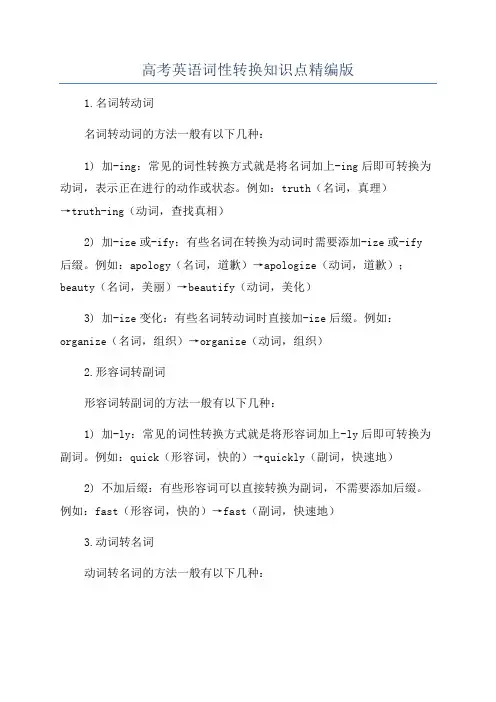
高考英语词性转换知识点精编版1.名词转动词名词转动词的方法一般有以下几种:1) 加-ing:常见的词性转换方式就是将名词加上-ing后即可转换为动词,表示正在进行的动作或状态。
例如:truth(名词,真理)→truth-ing(动词,查找真相)2) 加-ize或-ify:有些名词在转换为动词时需要添加-ize或-ify 后缀。
例如:apology(名词,道歉)→apologize(动词,道歉);beauty(名词,美丽)→beautify(动词,美化)3) 加-ize变化:有些名词转动词时直接加-ize后缀。
例如:organize(名词,组织)→organize(动词,组织)2.形容词转副词形容词转副词的方法一般有以下几种:1) 加-ly:常见的词性转换方式就是将形容词加上-ly后即可转换为副词。
例如:quick(形容词,快的)→quickly(副词,快速地)2) 不加后缀:有些形容词可以直接转换为副词,不需要添加后缀。
例如:fast(形容词,快的)→fast(副词,快速地)3.动词转名词动词转名词的方法一般有以下几种:1) 加-ing:常见的词性转换方式就是将动词加上-ing后即可转换为名词,表示该动作的状态或结果。
例如:paint(动词,绘画)→painting(名词,绘画)2) 加-er:有些动词转换为名词时需要添加-er后缀,表示该动词的展现者或从事者。
例如:teach(动词,教)→teacher(名词,教师)3) 加-ion或-ment:有些动词转换为名词时需要添加-ion或-ment后缀。
例如:inform(动词,通知)→information(名词,信息)4.形容词转名词形容词转名词的方法一般有以下几种:1) 加-ness:常见的词性转换方式就是将形容词加上-ness后即可转换为名词,表示该形容词的性质或状态。
例如:kind(形容词,友善的)→kindness(名词,友善)2) 不加后缀:有些形容词可以直接转换为名词,不需要添加后缀。
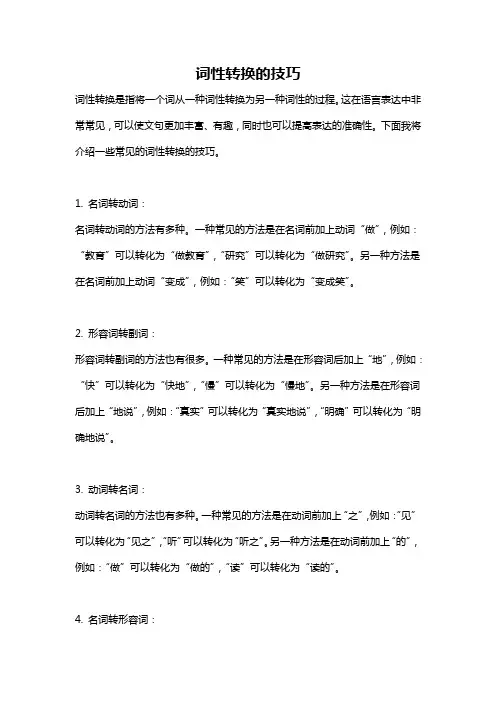
词性转换的技巧词性转换是指将一个词从一种词性转换为另一种词性的过程。
这在语言表达中非常常见,可以使文句更加丰富、有趣,同时也可以提高表达的准确性。
下面我将介绍一些常见的词性转换的技巧。
1. 名词转动词:名词转动词的方法有多种。
一种常见的方法是在名词前加上动词“做”,例如:“教育”可以转化为“做教育”,“研究”可以转化为“做研究”。
另一种方法是在名词前加上动词“变成”,例如:“笑”可以转化为“变成笑”。
2. 形容词转副词:形容词转副词的方法也有很多。
一种常见的方法是在形容词后加上“地”,例如:“快”可以转化为“快地”,“慢”可以转化为“慢地”。
另一种方法是在形容词后加上“地说”,例如:“真实”可以转化为“真实地说”,“明确”可以转化为“明确地说”。
3. 动词转名词:动词转名词的方法也有多种。
一种常见的方法是在动词前加上“之”,例如:“见”可以转化为“见之”,“听”可以转化为“听之”。
另一种方法是在动词前加上“的”,例如:“做”可以转化为“做的”,“读”可以转化为“读的”。
4. 名词转形容词:名词转形容词的方法有多种。
一种常见的方法是在名词后加上“的”,例如:“困难”可以转化为“困难的”,“美丽”可以转化为“美丽的”。
另一种方法是在名词前加上“具有”,例如:“价值”可以转化为“具有价值的”,“特点”可以转化为“具有特点的”。
5. 副词转动词:副词转动词的方法也有多种。
一种常见的方法是在副词后加上动词“做”,例如:“迅速”可以转化为“迅速做”,“安静”可以转化为“安静做”。
另一种方法是在副词后加上动词“变成”,例如:“成形”可以转化为“变成成形”,“明亮”可以转化为“变成明亮”。
6. 状语转形容词:状语转形容词的方法也有多种。
一种常见的方法是在状语前加上形容词“是”,例如:“完全”可以转化为“是完全的”,“不可避免”可以转化为“是不可避免的”。
另一种方法是在状语前加上形容词“之”,例如:“明显”可以转化为“之明显”,“难以置信”可以转化为“之难以置信”。
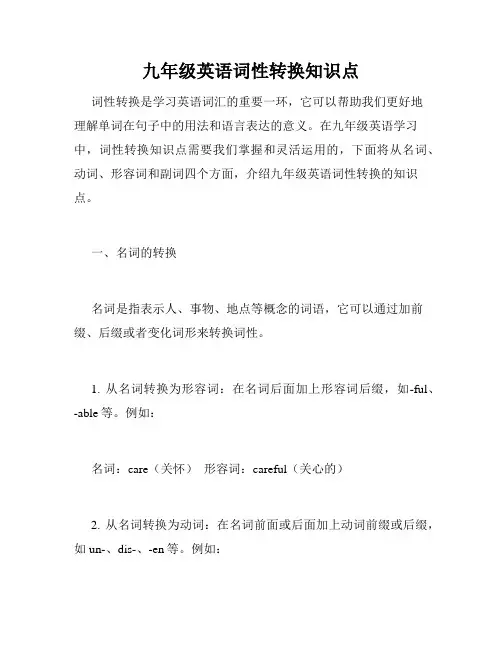
九年级英语词性转换知识点词性转换是学习英语词汇的重要一环,它可以帮助我们更好地理解单词在句子中的用法和语言表达的意义。
在九年级英语学习中,词性转换知识点需要我们掌握和灵活运用的,下面将从名词、动词、形容词和副词四个方面,介绍九年级英语词性转换的知识点。
一、名词的转换名词是指表示人、事物、地点等概念的词语,它可以通过加前缀、后缀或者变化词形来转换词性。
1. 从名词转换为形容词:在名词后面加上形容词后缀,如-ful、-able等。
例如:名词:care(关怀)形容词:careful(关心的)2. 从名词转换为动词:在名词前面或后面加上动词前缀或后缀,如un-、dis-、-en等。
例如:名词:agree(同意)动词:disagree(不同意)3. 从名词转换为副词:在名词后面加上副词后缀-ly。
例如:名词:quick(快)副词:quickly(快速地)二、动词的转换动词是表示动作、状态或者存在的词语,它可以通过加前缀、后缀或者变化词形来转换词性。
1. 从动词转换为名词:在动词前面加上名词前缀或者后缀,如re-、-ion等。
例如:动词:help(帮助)名词:helper(帮助者)2. 从动词转换为形容词:在动词后面加上形容词后缀-able、-ing等。
例如:动词:interest(使感兴趣)形容词:interesting(有趣的)3. 从动词转换为副词:在动词后面加上副词后缀-ly。
例如:动词:quick(快)副词:quickly(快速地)三、形容词的转换形容词是用来描述名词的性质、特征和状态的词语,它可以通过加前缀、后缀或者变化词形来转换词性。
1. 从形容词转换为名词:在形容词前面加上名词前缀-ness、-ity等。
例如:形容词:happy(快乐的)名词:happiness(快乐)2. 从形容词转换为动词:在形容词前面加上动词前缀-ize、-en 等。
例如:形容词:modern(现代的)动词:modernize(使现代化)3. 从形容词转换为副词:在形容词后面加上副词后缀-ly。
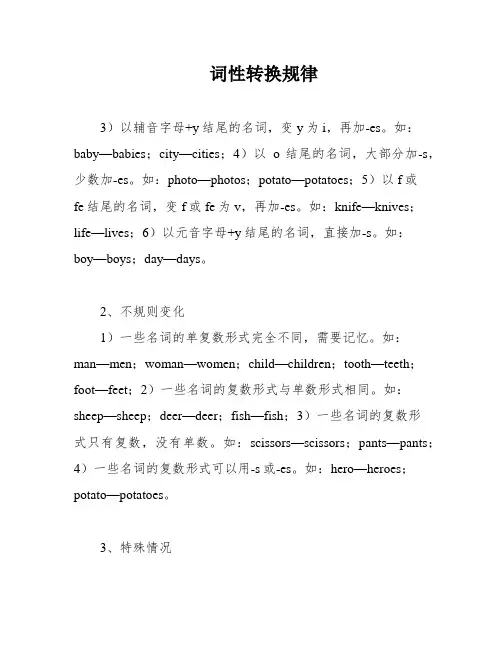
词性转换规律3)以辅音字母+y结尾的名词,变y为i,再加-es。
如:baby—babies;city—cities;4)以o结尾的名词,大部分加-s,少数加-es。
如:photo—photos;potato—potatoes;5)以f或fe结尾的名词,变f或fe为v,再加-es。
如:knife—knives;life—lives;6)以元音字母+y结尾的名词,直接加-s。
如:boy—boys;day—days。
2、不规则变化1)一些名词的单复数形式完全不同,需要记忆。
如:man—men;woman—women;child—children;tooth—teeth;foot—feet;2)一些名词的复数形式与单数形式相同。
如:sheep—sheep;deer—deer;fish—fish;3)一些名词的复数形式只有复数,没有单数。
如:scissors—scissors;pants—pants;4)一些名词的复数形式可以用-s或-es。
如:hero—heroes;potato—potatoes。
3、特殊情况1)有些名词的复数形式有两种,但含义不同。
如:brother—brothers(兄弟),brethren(同教会的);die—dies (模具),dice(骰子);2)有些名词的复数形式有两种,但用法不同。
如:XXX(衣服)在表示“一件衣服”时,是不可数名词,没有复数形式;但在表示“衣服”时,是可数名词,有复数形式。
To form XXX + y。
change y to i and add es。
For example。
baby es babies。
city es cities。
and family es families.To form the plural of words ending in f or fe。
change f or fe to ves。
For example。
XXX。
XXX。
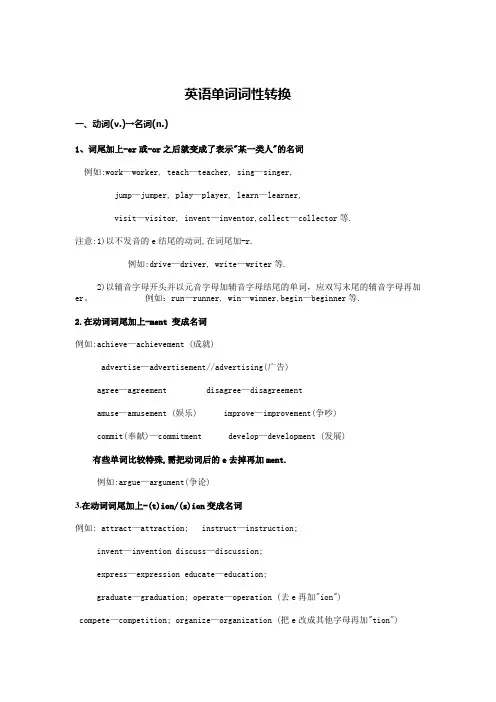
英语单词词性转换一、动词(v.)→名词(n.)1、词尾加上-er或-or之后就变成了表示"某一类人"的名词例如:work—worker, teach—teacher, sing—singer,jump—jumper, play—player, learn—learner,visit—visitor, invent—inventor,collect—collector等.注意:1)以不发音的e结尾的动词,在词尾加-r.例如:drive—driver, write—writer等.2)以辅音字母开头并以元音字母加辅音字母结尾的单词,应双写末尾的辅音字母再加er。
例如:run—runner, win—winner,begin—beginner等.2.在动词词尾加上-ment 变成名词例如:achieve—achievement (成就)advertise—advertisement//advertising(广告)agree—agreement disagree—disagreementamuse—amusement (娱乐) improve—improvement(争吵)commit(奉献)—commitment develop—development (发展)有些单词比较特殊,需把动词后的e去掉再加ment.例如:argue—argument(争论)3.在动词词尾加上-(t)ion/(s)ion变成名词例如: attract—attraction; instruct—instruction;invent—invention discuss—discussion;express—expression educate—education;graduate—graduation; operate—operation (去e再加"ion")compete—competition; organize—organization (把e改成其他字母再加"tion")decide—decision conclude—conclusion (把de改为s再加"ion")describe—description描写,描绘 (这是特例,不规则变化)4.在动词词尾加上-ance变成名词例如: appear—appearance (外貌;出现)perform—performance (演出)accept—acceptance (接受)resist-resistance n.抵抗,阻力5.在动词词尾加-ing变成名词 (方法与动词变为现在分词的方法相同)例如:meet—meeting build—building wait—waitingbathe—bathing say—saying(谚语) mean—meaning注意:以辅音字母开头并以元音字母加辅音字母结尾的单词,应双写末尾的辅音字母再加-ing如:swim—swimming shop—shopping begin—beginning二、动词(v.)→形容词(adj.)1.动词后面加able,以e结尾的动词则去e加able,表示具有此性质,特点或属性.例如: afford-affordable;love-lovable2.动词后面加ed,以e结尾的动词则直接加d,表示被动性的属性或特点.例如: scatter-scattered use-used3不规则的动词则必须记忆,记住其过去分词形式.规律不大,意义同(b).三.名词(n.)→形容词(adj.)1.在名词后面加-y可以变成形容词(尤其是一些与天气有关的名词)例如: rain—rainy, cloud—cloudy, wind—windy, snow—snowy,health—healthy, luck—lucky,anger—angry guilt—guilty(内疚的)tourist—touristy(游客多的) , salt (盐)—salty (咸的)silk(丝绸)—silky(丝绸般的), sleep—sleepy (昏昏欲睡的)注意:1)如果以辅音字母开头并以元音字母加辅音字母结尾,这时应双写辅音字母再加"-y".如: sun—sunny, fun—funny, fog—foggy(有雾的), fur—furry(毛皮的)2)少数以不发音的e结尾的名词变为形容词时,应去掉e再加"-y".如: noise—noisy, ice—icy, shine—shiny(发亮的), taste(口味)—tasty(甜的) 2.名词后面加-ed,以e结尾的直接加d.例如: spot(斑点)—spotted(有斑点的); talent—talented (有天赋的)organize—organized 有组织的; balance—balanced(平衡的)3.一些抽象名词在词尾加-ful可以变为形容词例如:care—careful, thank—thankful, help—helpful,use—useful, meaning—meaningful4.在名词后加-less构成含有否定意义的形容词例如:care—careless(粗心的), use—useless(无用的)hope—hopeless(没希望的),home—homeless(无家可归的)5.一些以-ce结尾的名词,把-ce改为-t变成形容词例如: difference—different, silence—silent, confidence—confident6.在名词后加-ly变为形容词例如: friend—friendly, love—lovely, live---lively7.在名词后加-ous变为形容词例如: danger—dangerous prosperous a 繁荣的(pro 在前+sper 希望+ous)8.名词后面加-al变为形容词例如: music—musical; medicine—medical (这个比较特殊)9名词后面加-able变为形容词,如果以e结尾就去e再加"-able".例如: adjust—adjustable 可调整的 value—valuable有价值的10.名词后面加-en变成形容词例如: wood—wooden 木制的 wool—woolen 羊毛的四.形容词(adj.)→副词(adv.)▲一般在形容词的词尾加-ly可以变成副词例如: quick—quickly, slow—slowly, loud—loudly, sudden—suddenly 等例如:possible—possibly, terrible—terribly。
英语单词词性转换方法法英语单词词性转换方法法词性指以词的特点作为划分词类的根据。
英语单词词性转化有着一些基本规律,下面由店铺分享给大家!.动词(v.)→形容词(adj.)(a)动词后面加able,以e结尾的动词则去e加able,表示具有此性质,特点或属性. 例如: afford-affordable;love-lovable(b)动词后面加ed,以e结尾的动词则直接加d,表示被动性的属性或特点. 例如: scatter-scattered use-used(c)不规则的动词则必须记忆,记住其过去分词形式.规律不大,意义同(b)..名词(n.)→形容词(adj.)(a)在名词后面加-y可以变成形容词(尤其是一些与天气有关的名词) 例如: rain—rainy, cloud—cloudy, wind—windy, snow—snowy, health—healthy, luck—lucky,anger—angry guilt—guilty(内疚的) tourist—touristy(游客多的) , salt (盐)—salty (咸的)silk(丝绸)—silky(丝绸般的), sleep—sleepy (昏昏欲睡的)注意:1)如果以重读闭音节结尾,且词尾只有一个辅音字母,这时应双写辅音字母再加"-y".如: sun—sunny, fun—funny, fog—foggy(有雾的), fur—furry(毛皮的)2)少数以不发音的e结尾的名词变为形容词时,应去掉e再加"-y".如: noise—noisy, ice—icy, shine—shiny(发亮的), taste(口味)—tasty(甜的)(b)名词后面加-ed,以e结尾的直接加d.例如: spot(斑点)—spotted(有斑点的); talent—talented (有天赋的) organize—organized 有组织的; balance—balanced(平衡的)(c)一些抽象名词在词尾加-ful可以变为形容词例如:care—careful, thank—thankful, help—helpful,use—useful, meaning—meaningful(d)在名词后加-less构成含有否定意义的形容词例如:care—careless(粗心的), use—useless(无用的)hope—hopeless(没希望的),home—homeless(无家可归的)(e)一些以-ce结尾的名词,把-ce改为-t变成形容词例如: difference—different, silence—silent, confidence—confident(f).在名词后加-ly变为形容词例如: friend—friendly, love—lovely, live---lively(g).在名词后加-ous变为形容词例如: danger—dangerous(h)名词后面加-al变为形容词例如: music—musical; medicine—medical (这个比较特殊)(i)名词后面加-able变为形容词,如果以e结尾就去e再加"-able". 例如: adjust—adjustable 可调整的. value—valuable有价值的(j)名词后面加-en变成形容词例如: wood—wooden 木制的 wool—woolen 羊毛的.动词(v.)→名词(n.)(a)词形不变,词性改变例如:work, study, water, plant等可以用作动词(工作,学习,浇水,种植),也可以用作名词(工作,学习,水,植物).(b)一些动词在词尾加上-er或-or之后就变成了表示"某一类人"的名词例如:work—worker, teach—teacher, sing—singer,jump—jumper, play—player, learn—learner,visit—visitor, invent—inventor,collect—collector等.注意:1)以不发音的e结尾的动词,在词尾加-r.例如:drive—driver, write—writer等.2)以重读闭音节结尾,且末尾只有一个辅音字母的动词,应双写末尾的辅音字母,再加-er例如:run—runner, win—winner,begin—beginner等.(c)在动词词尾加上-ment 变成名词例如:achieve—achievement (成就)advertise—advertisement//advertising(广告)agree—agreement disgree—disagreementamuse—amusement (娱乐) improve—improvement(争吵)commit(奉献)—commitment develop—development (发展) depart—department (局,部) govern(统治)—government(政府) manage—management (管理) equip—equipment (装备)有些单词比较特殊,需把动词后的e去掉再加ment.例如:argue—argument(争论)(d)在动词词尾加上-(t)ion/(s)ion变成名词例如: attract—attraction; instruct—instruction;invent—invention discuss—discussion;express—expression educate—education;graduate—graduation; operate—operation (去e再加"ion") compete—competition; organize—organization (把e改成其他字母再加"tion") decide—decision conclude—conclusion (把de 改为s再加"ion")describe—description描写,描绘 (这是特例,不规则变化)(e)在动词词尾加上-ance变成名词例如: appear—appearance (外貌;出现)perform—performance (演出)accept—acceptance (接受)(f)在动词词尾加-ing变成名词 (方法与动词变为现在分词的方法相同)例如:meet—meeting build—building wait—waiting bathe—bathing say—saying(谚语) mean—meaningend —ending train —training wash—washing 注意:以重读闭音节结尾,且末尾只有一个辅音字母的动词,应双写末尾的辅音字母,再加-ing如:swim—swimming shop—shopping begin—beginning(g)其他一些比较特殊的变化例如: Beg(乞讨)—beggar(乞丐) behave(行为举止)—behavior know(知道)—knowledge(知识) fly—flight (飞行)heat (加热)—heat(热量) hit (撞击)—hit( 轰动一时的人或物,碰撞) mix (混合)—mixture(混合物) press(按,压)—pressure(压力) sit(坐)—seat (座位) succeed—success(成功)tour—tour(旅游)/ tourist (游客)形容词→副词一般在形容词的词尾加-ly可以变成副词。
词性转换翻译词性转换是英语语法中的一个重要概念,它指的是将一个单词从一种词性转变为另一种词性。
通常,词性转换是通过添加前缀、后缀、改变词形或使用不同的词根来完成的。
下面是一些常见的词性转换及其翻译例子。
1. 名词转动词名词可以通过加上动词缀-ize或-ify转化为动词。
例如:- Noun (名词): hospital (医院)- Verb (动词): hospitalize (住院)2. 形容词转动词形容词可以通过加上动词缀-en或-ify转化为动词。
例如:- Adjective (形容词): soft (柔软的)- Verb (动词): soften (变软)3. 动词转名词动词可以通过添加名词后缀-er或-or转化为名词。
例如:- Verb (动词): sing (唱歌)- Noun (名词): singer (歌手)4. 形容词转名词形容词可以通过添加名词后缀-ness或-ity转化为名词。
例如:- Adjective (形容词): happy (快乐的)- Noun (名词): happiness (快乐)5. 名词转形容词名词可以通过添加形容词后缀-al或-ous转化为形容词。
例如:- Noun (名词): music (音乐)- Adjective (形容词): musical (音乐的)6. 动词转形容词动词可以通过添加形容词后缀-ing或-ed转化为形容词。
例如:- Verb (动词): interest (感兴趣)- Adjective (形容词): interesting (有趣)7. 名词转副词名词可以通过添加副词后缀-ly转化为副词。
例如:- Noun (名词): quick (快)- Adverb (副词): quickly (快速地)8. 形容词转副词形容词可以通过添加副词后缀-ly转化为副词。
例如:- Adjective (形容词): careful (小心的)- Adverb (副词): carefully (小心地)词性转换在英语中非常常见,掌握这些转换规则可以帮助我们更好地理解和表达英语。
词性转换归纳总结选修七词性转换是语言学习中一个重要的技巧,它可以帮助我们灵活运用不同的词性来表达不同的意思。
在选修七的学习中,我们涉及了形容词、副词、动词、名词等不同的词性。
本文将针对这些词性进行归纳总结,以帮助大家更好地掌握词性转换的技巧。
一、形容词转换形容词是用来修饰名词或代词的词性,常见的形容词转换有以下几种情况:1. 形容词变副词形容词可以通过在词尾加上-ly来转换为副词。
例如:- quick(形容词)→ quickly(副词)- careful(形容词)→ carefully(副词)2. 形容词变名词形容词可以通过在词尾加上-ness或-ity来转换为名词。
例如:- happy(形容词)→ happiness(名词)- popular(形容词)→ popularity(名词)3. 形容词变动词形容词可以通过添加动词的词尾来转换为动词。
例如:- tired(形容词)→ tire(动词)- interested(形容词)→ interest(动词)二、副词转换副词是用来修饰动词、形容词或其他副词的词性,常见的副词转换有以下几种情况:1. 副词变形容词副词可以通过添加形容词的词尾来转换为形容词。
例如:- slowly(副词)→ slow(形容词)- beautifully(副词)→ beautiful(形容词)2. 副词变名词副词可以通过在词尾加上-ness或-ty来转换为名词。
例如:- quickly(副词)→ quickness(名词)- happily(副词)→ happiness(名词)三、动词转换动词是表达动作或状态的词性,常见的动词转换有以下几种情况:1. 动词变形容词动词可以通过在词尾加上-ing或-ed来转换为形容词。
例如:- interest(动词)→ interesting(形容词)- excite(动词)→ excited(形容词)2. 动词变名词动词可以通过在词尾加上-ing或-ment来转换为名词。
初中英语词性转换规律总结附学习方法词性转换是英语学习中的重要内容之一,主要是指名词、动词、形容词和副词之间的转换。
以下是初中英语词性转换的常见规律总结:1.名词转动词:可以通过加上动词的前缀或后缀来转换。
- 加前缀:表示开始、做其中一种动作或进行其中一种活动。
例如:end(名词)→extend(动词)- 加后缀:表示把事物加上或变成其中一种状态。
例如:hope(名词)→hopeful(形容词)、lesson(名词)→ lessen(动词)2.动词转名词:可以通过加上名词的后缀来转换。
- 加后缀:表示其中一种行为、状态或事物。
例如:enjoy(动词)→ enjoyment(名词)、read(动词)→ reader(名词)3. 形容词转副词:通常在形容词后加上-ly。
- 加后缀:表示程度或方式。
例如:quick(形容词)→ quickly(副词)、careful(形容词)→ carefully(副词)4. 副词转形容词:在副词前加上very或更高级形容词。
- 加修饰词:表示强调程度。
例如:soon(副词)→very soon(形容词)、good(副词)→better(形容词)学习方法:1.多读多写:通过阅读和写作,积累词汇并学会词性之间的转换。
2.制作词性转换表格:将常见的词性转换规律整理成表格,方便记忆和查找。
3.多做练习:完成词性转换的练习题,提高应用能力。
4.注意词义变化:在词性转换过程中,要注意词义的变化,确保转换后的词语在上下文中使用正确。
总之,词性转换是一个积累和灵活运用的过程,需要多做练习,多积累常见的词性转换规律,以提高自己的语言运用能力。
动词变名词1.v+ ment 结尾achieve---achievement 成就develop---development advertise--- advertisement// advertising disgree—disagreement agree—agreement department 局,部apartment 公寓experiment 实验,试验amusement 娱乐equip 装备---equipment 装备,器材argue---argument争吵govern 统治—government 政府commit奉献—commitment manage---management 经营管理compliment 称赞,恭维2.V+ tion 结尾admit 承认—admission attract吸引—attraction 有吸引力的事或人;令人向往的地方conclude—conclusion 结论illustrate 阐明,举例说明--illustration compete—competition 竞争,比赛invite—invitation discuss—discussion 讨论inspire---inspiration 灵感,鼓舞人心的educate-----education--- decide----decisionpollute----pollution 污染describe—description描写,描绘predict---prediction 预言express 表达----expression 词语;表达pronounce ---pronunciation 方式resolve 决心-----resolution 决心graduate 毕业—graduationimpress 给人印象—impression 印象operate 操作,动手术—operationpermit 允许-----permission organize----organizationsuggest-建议,暗示--suggestion imagine—imagination 想象力solve解决-----solution 解决方法introduce—introduction 介绍instruct—instruction 指导,介绍invent—inventor / invention3.V+ ance 结尾allow—allowance 允许perform----performance 演出appear—appearance 外貌,出现exist—existance 存在4.V+ ing 结尾bathe 洗澡---bathing mean ---- meaning 意义end 结束----ending 结尾,结局say-----saying 谚语train 训练---training5.V+ 其他employ--employer 雇主,老板Beg(乞讨)—beggar 乞丐--employee雇员sit--seat 座位believe—belief 信仰mix 混合-----mixture 混合物behave 行为,举止----behavior press 按,压—pressure 压力know---knowledge receive—receptionist 接待员fly—flight 飞行serve—service 服务heat 加热---heat 热量succeed-- successhit 撞击------hit 轰动一时的人或物,tour 在-----旅游,在-----作巡回演出碰撞直接+地点tour China ---tour 旅游/1 / 6tourist 游客退survive—survival--survivor 幸存者pursue—pursuit 追求,从事arrive--arrivalpropose—proposal 建议到达analyze撤收回;—analysis 分析withdraw—withdrawal 取钱;名词变形容词+y 1名词rain---rainy anger 生气-----angrysnow---snowy 诚实的honest—honestysun—hunger---hungry sunnytourist------touristy 游客多的—fogfoggy有雾的business---busyfur----furry 毛皮的salt 盐--- salty 咸的罪恶guilt ---guilty 内疚的shine---shiny 发亮的health---healthysilk 丝绸luck---lucky —silky 丝绸般的sleep---sleepy 昏昏欲睡的cloud---cloudytaste 口味,品味windy ------tasty 甜的—wind+ ed2.名词offended 生气的平衡的–balanced balancecrowded 拥挤的----spotted spot 斑点,地点有斑点的polluted 被污染的有天赋的talent-----talentedpleased 高兴的organized 有组织的distusted 厌恶的+ ful/less.名词3use---useless/ useful—meaningmeaningful 有意义的thank—粗心的careful/ careless —小心的;thankful 充满感激的carepeace 和平help---helpful / helpless---- peaceful 平静的,宁静的—homehomeless 无家可归的playful 顽皮的,爱玩耍的colour---colourful痛苦的pain 疼痛---painful+ able4.名词knowledge---knowledgeable 可调整的adjustablesuit 一套-----suitable 合适的comfort---comfortable+ ous名词5.confidence----confident courageous courage—勇敢的difference---different dangerous—dangerdependence—-----mysterious mystery 神秘神秘的dependent independence--independentt 变6.ce结尾7. alnation—national 国家的附加的,额外的additional —Additioneducation---educational有教育意义的classical —Class经典的tradition----traditional 传统的医学的药medicine ----medicalorigin起源music---musical---original 新颖的;独创的grammarnature---natural —自然的grammatical 语法的globe)私人的person---personal (—global 全球的2 / 68.名词+ lyfriend—friendly9.+ en 结尾wood—wooden 木制的live---lively 活跃的,有生气的woollove—lovely 可爱的—woolen 羊毛的其他10.love—loving 慈爱的energy精力---energeticdeath---dead战略的strategic strategy—pleasure---pleasant / pleased 傻子—foolish 愚蠢的foolpopularity 流行性—popular freedom 自由—free 空的,免费的pride---proud高度—high heightscientist----scientific 科学的illness 疾病--- ill形容词变副词+ ly形容词1.bad—badly most 多数-----mostly 多半,大多数bright—brightly 明亮地normal---normally 正常地casual—casually 随意地quick—quicklyclear—clearly 清楚地quiet—quietly 轻轻地,安静地complete—completely 完全real—reallycorrect---correctly 正确地recent 最近的----recently 最近;近来final--finally hard 难的;努力地---hardly 几乎不fortunate—fortunately幸运地late 迟的—lately 最近;近来general—generally 一般来讲sad--sadlyloud—loudly slow---slowlyparticular 特殊的,独特的special—specially 专门,特殊地—particularly specific---specifically 特定地,明确地polite—politely strong—strongly 坚决地,强烈地proper 合适的-,恰当的---properly sudden—suddenly突然main------mainly 主要地usual—usually2. 以le 结尾的去e + ycomfortable---comfortably simple ----simply 仅仅;只;简单地gentle—gently terrible---terriblypossible---possibly3. 辅音字母+ y 变ilyeasy—easilyheavy—heavilyhappy--happily4.特殊good—well好地well 身体健康的,井true—truly形容词变名词efficient有效率的—efficiency 效率dependent—dependenc依赖性patient—patience/impatience independent—independency 独立性true—truth high —height3 / 6wide—width long—lengthpossible—possibility urgent—urgency 紧急responsible —responsibilityprosperous—prosperity 繁荣accurate—accuracy 准确性形容词变动词modern—modernize social--socializefast--fasten short/shorten long—lengthen—length(n.) wide--widenless--lessenstrong—strengthen—strength(n.)large—enlarge名词变动词computer--computerize名词---形容词—副词beauty 美,美人—beautiful—noise—noisy—noisilypride—proud—proudly骄傲地beautifully sadness—sadcareful—carefully —sadly care—safety 安全;—care—carelesscarelessly安全的地方—safe—safelysilence—silent---silently 默默地difference---different---differently success—successful——fortunefortunate—fortunately/unfortusuccessfully truth—truenately—trulyunluck—unlucky—unluckily——happinesshappyhappilywonder 奇迹hungry--hungrily hunger——wonderful—wonderfully—healthhealthyhealthily —luckily —luckyluck—形容词名词—方位的词North---northern —EasteasternIn the west of China—western WestIn the western part of ChinaSouthsouthern —四大洲名词-----形容词Asian ----–亚洲Asia----- AfricanAfrica 非洲欧洲Europe ----- European-----American America 美洲既是形容词又是副词;early get up earlyan early trainbe late for classlatecome late for schooldeep dive deep into the seaa hole deep large4 / 6high jump high;a high mountainhard a hard question;a hard stonework hard / study hardrain hardlong It takes too longIt takes a long timefar jump farMy home is far from schoolstraight a straight linego straight along here5 / 6.6 / 6。
英语词性转换规则大全之有琴礁磷创作(1)v.-n.动词转化为名词,post-postage mail-mailweigh-weight advise-adviceact-actor / actress-activechange-change-changeable(3) v.-a.-ad.-n.动词转化成形容词,副词,名词fill-fullneed-necessary-necessarilyinterest(v. / n.) interested /interestingperson personal ( 个人的; 私人的 )fun funnygentleman gentlemen human humanspossible possibly probable probably(7)a. ad. n.形容词转化为副词,名词true truly truthlucky luckily luck(8)原级比较级最高级far farther / further farthest / furthestlittle less least一、名词变成形容词的方法1. 在名词后面加-y可以酿成形容词(尤其是一些与天气有关的名词)。
例如:rain—rainy, cloud—cloudy, wind—windy, snow—snowy, health—healthy, luck—lucky等。
注意:1)如果名词以重读闭音节结尾,且词尾只有一个辅音字母,这时应双写词尾的辅音字母再加-y。
如:sun—sunny, fun—funny等。
2)少数以不发音的e结尾的名词变成形容词时,应去掉e再加-y。
例如:noise—noisy, ice—icy 等。
2. 一些抽象名词在词尾加-ful可以变成形容词。
例如:care—careful, thank—thankful, help—helpful, use—useful, beauty—beautiful等。
develop---development动词变名词1.v+ ment 结尾achieve---achievement 成就advertise--- advertisement// advertising agree — agreement apartment 公寓 amusement 娱乐argue---argume nt 争吵 commit 奉献一commitment compliment 称赞,恭维 2.V+ tion 结尾admit 承认一admission attract 吸引一attraction 有吸引力的事或人; con clude — con clusi on 结论 compete —competiti on 竞争,比赛 discuss — discussion 讨论 educate educationdisgree —disagreementdepartment 局,部 experiment 实验,试验 equip 装备---equipment 装备,器材 govern 统治 —government 政府manage---management 经营管理令人向往的地方 illustrate 阐明,举例说明 --illustration invite —invitation inspire---inspiration 灵感,鼓舞人心的decide - decision describe —description 描写,描绘 express 表达 - e xpression 词语;表达方式graduate 毕业— graduation operate 操作,动手术 —operation organize--------- organizationimagine — imagination 想象力introduce — introduction 介绍instruct — instruction 指导, 介绍 invent —inventor / invention 3.V+ ance 结尾 allow —allowance 允许appear —appearance 外貌 ,出现 4.V+ ing 结尾 bathe 洗澡---bathing end 结束 --------- e nding 结尾,结局train 训练 ---training 5.V+ 其他 Beg (乞讨)—beggar 乞丐 sit--seat 座位 believe —belief 信仰 behave 行为,举止 ---------------- behaviorknow---knowledge fly —flight 飞行 heat 加热 ---heat 热量 hit 撞击------------ hit 轰动一时的人或物, 碰撞pollute pollution 污染predict---prediction 预言 pronounce ---pronunciationresolve 决心 -- resolution 决心impress 给人印象 —impression 印象 permit 允许 -- permissionsuggest-建议,暗示--suggestion solve 解决 - s olution 解决方法perform performance 演出exist —existance 存在 mean -- meaning 意义 say -- saying 谚语employ--employer 雇主,老板 --employee雇员mix 混合 ---- m ixture 混合物 press 按,压一pressure 压力 receive —receptionist 接待员serve —service 服务 succeed-- success tour 在 --- 旅游,在 --- 作巡回演出 直接 + 地点 tour China ---tour 旅游 / tourist 游客 pursue —pursuit 追求,从事 propose — proposal 建议 withdraw — withdrawal 取钱;收回;撤 名词变形容词 1 名词 +y anger 生气 angryhonest—honesty 诚实的hunger---hungry fog—foggy 有雾的fur ---- f urry 毛皮的guilt 罪恶---guilty 内疚的health---healthy luck---luckycloud---cloudy wind —windy 2.名词+ ed bala nee —ala need 平衡的spot 斑点,地点---------- s potted 有斑点的talent - talented 有天赋的organized 有组织的distusted 厌恶的3.名词+ ful/less meaning—meaningful 有意义的eare—eareful/ eareless 小心的;粗心的help---helpful / helpless home—homeless 无家可归的eolour---eolourful pain 疼痛---painful 痛苦的4.名词+ able adjustable 可调整的eomfort---eomfortable5. ------------------- 名词+ ous eourage—eourageous 勇敢的danger—dangerous mystery 神秘---------------- mysterious 神秘的6. ee 变t7. al 结尾Addition —additional 附加的,额外的Class—elassieal 经典的medieine 药-------------- medieal 医学的musie---musieal nature---natural 自然的person---personal (私人的)退survive—survival--survivor 幸存者arrive-- arrival 到达analyze—analysis 分析rain---rainy snow---snowy sun—sunny tourist - touristy 游客多的business---busy salt 盐--- salty 咸的shine---shiny 发亮的silk 丝绸—silky 丝绸般的sleep---sleepy 昏昏欲睡的taste 口味,品味tasty 甜的offended 生气的erowded 拥挤的polluted 被污染的pleased 高兴的use---useless/ useful tha nk—tha n kfu l 充满感激的peaee 和平-------------- p eaeeful 平静的,宁静的playful 顽皮的,爱玩耍的knowledge---knowledgeablesuit 一套-- suita b l e 合适的eonfidenee - e onfidentdifferenee---different dependenee—dependent independenee--independent nation—national 国家的edueati on---educati onal 有教育意义的tradition traditional 传统的origin 起源---original 新颖的;独创的grammar—grammatieal 语法的globe—global 全球的8.名词+ lyfriend—friendly 9.+ en 结尾live---lively 活跃的,有生气的wood—woode n 木制的love—lovely 可爱的wool —woole n 羊毛的10. 其他energy精力---energetic love—loving 慈爱的strategy—strategic 战略的death---deadfool 傻子—foolish 愚蠢的pleasure---pleasant / pleased freedom 自由—free 空的,免费的popularity 流行性—popularheight 高度—high pride---proudillness 疾病--- ill scientist scientific 科学的形容词变副词1.形容词+ lybad—badly most 多数 -- mostly 多半,大多数bright—brightly 明亮地normal---normally 正常地casual—casually 随意地quick—quicklyclear—clearly 清楚地quiet—quietly 轻轻地,安静地complete—completely 完全real—reallycorrect---correctly 正确地recent 最近的recently 最近;近来final--finally hard 难的;努力地---hardly 几乎不fortunate—fortunately 幸运地late 迟的—lately 最近;近来general—generally 一般来讲sad--sadlyloud—loudly slow---slowlyparticular 特殊的,独特的special—specially 专门,特殊地—particularly specific---specifically 特定地,明确地polite—politely strong—strongly 坚决地,强烈地proper 合适的-,恰当的---properly sudden— sudde nly 突然main ---- m ainly 主要地usual—usually2. 以le 结尾的去e + ycomfortable---comfortably simple - simply 仅仅;只;简单地gentle—gently terrible---terriblypossible---possibly3. 辅音字母+ y 变ilyeasy—easilyheavy—heavilyhappy--happily4.特殊good—well 好地well 身体健康的,井true—truly形容词变名词efficient 有效率的—efficiency 效率depe nden—depe ndenc依赖性patient—patience/impatience independent—independency 独立性true—truth high—heightwide—width possible—possibility responsible—responsibility prosperous—prosperity 繁荣形容词变动词modern—modernize fast--fasten long—lengthen—length(n.)less--lessen strong—strengthen—strength(n.) large—enlarge 名词变动词computer--computerize 名词---形容词—副词beauty 美,美人—beautiful —beautifully care—careful—carefully care—careless—carelessly difference---different---differentl yfortune—fortunate—fortunately/unfo rtu nately happiness—happy—happily hunger—hungry--hungrily health—healthy—healthily luck—lucky—luckily方位的词名词—形容词East—eastern West—westernSouth—southern 四大洲名词形容词Asia 亚洲---- AsianAfrica 非洲-- AfricanEurope 欧洲-- EuropeanAmerica 美洲--- American既是形容词又是副词long—length urgent—urgency 紧急accurate—accuracy 准确性social--socializeshort/shortenwide--widennoise—noisy—noisily pride—proud—proudly 骄傲地sadness—sad—sadlysafety 安全;安全的地方—safe—safely silence—silent---silently 默默地success—successful—successfully truth—true—truly unluck—unlucky—unluckilywonder 奇迹—wonderful —wonderfullyNorth---northernIn the west of ChinaIn the western part of Chinaearly get up early ;anearly trainlate be late for classcome late for school deep dive deep into theseaa hole deep largehigh jump high;a high mountainhard a hard question;a hard stone work hard / study hard rainhardlong It takes too longIt takes a long timefar jump farMy home is far from school straight a straight line go straight along here。